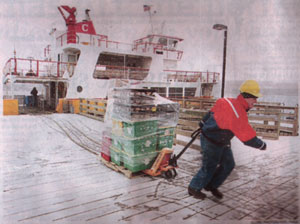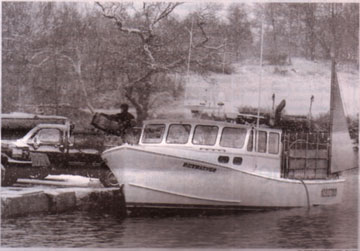
Endangered way of life
Tax hikes threaten islanders' homes
By Farah Stockman, Globe Staff, 12/8/2002

 HEBEAGUE, Maine -
A year ago, annoyed that property taxes on Hope Island had more than tripled,
its sole occupants, a New York millionaire and his wife, sought to escape
taxes by seceding from their town. They argued that their remote mansion,
boat house, and helicopter pad should constitute its own town, and that therefore
they should be able to set their own tax rate. HEBEAGUE, Maine -
A year ago, annoyed that property taxes on Hope Island had more than tripled,
its sole occupants, a New York millionaire and his wife, sought to escape
taxes by seceding from their town. They argued that their remote mansion,
boat house, and helicopter pad should constitute its own town, and that therefore
they should be able to set their own tax rate.
At the time, residents of the neighboring island of Chebeague laughed
at the couple, but this summer, when land on Chebeague was revalued, doubling
taxes on fourth-generation lobstermen, they began their own efforts to avoid
taxation. Now, many of the 320 year-round residents of this centuries-old
fishing village are pushing to amend Maine's constitution to give some homeowners
the same low tax rates offered to nature preserves, wildlife sanctuaries,
farms, and woodlands.
''Island communities are completely endangered,'' said David Hill, who
authored the current plan after deciding that secession was impractical for
Chebeague. ''At the turn of the century, there were 300 island communities
in Maine. ... Now there are 14. If there were any wildlife species with that
kind of decline, they'd be protected.''
The proposal, one of at least three antitax measures that could be considered
by the Maine Legislature in the coming months, illustrates the lengths to
which Mainers are willing to go to avoid one of the nation's highest property
tax burdens. Combined with the antitax fight on Hope Island, the move highlights
one of the most pressing issues in the state, and shines a spotlight on the
changing face of Maine's coast.
Seated in the cab of his pickup truck, with salt-encrusted boots and a
shotgun, Leon Hamilton looks like what his friends call him: ''a dying breed.''
The 54-year-old used to be one of a dwindling number of lobstermen working
the island's shores. Now he drives the ferry - a job he's grateful for because
it helps him keep up with the fastest-growing living expense here: property
taxes. On Chebeague, an island with one taxi, one grocery store, one police
officer, and a phone book as thin as a menu, ''extinction'' is what long-time
islanders fear.
''It's just a matter of time,'' Hamilton said. ''There won't be any lobstermen;
there won't be any boats. There will just be mansions on the water.''
This summer, Hamilton's taxes increased from $4,000 to $8,000. The narrow
strip of azure sea that shows through the birches from his kitchen window
was meant to help his ancestors keep an eye on their boats. But now his ''ocean
view'' has sent his taxes skyrocketing because wealthy out-of-staters - mostly
from Massachusetts - will pay generously for any patch of blue.
Hamilton admits that, for now, he can afford the taxes, but others are faring far worse.

Bette Tellinghuisen, whose land has been in the family since 1880, saw
her taxes rise from $5,500 to $11,000 - half of what she earns annually at
her own financial analyst business. ''I was physically ill when I got the
bill,'' Tellinghuisen said.
Wilbert Munroe, one of about 35 lobstermen left on the island, saw taxes
on his modest house jump from $2,200 to $6,000 - a sum he says equals all
the money he earned this summer after he paid to repair his boat.
''If you can see the ocean, it costs you money,'' said the tattooed 70-year-old,
standing amid his lobster traps and next to his caved-in garage.
Pamela Johnson, a real estate broker who grew up on Chebeague, says out-of-staters
consider it a bargain to pay as much as $460,000 for a seafront house.
''I have a number of people calling from Cape Cod,'' she said. ''They are feeling crowded there.''
It doesn't matter much, islanders say, that their property values also doubled.
''My property is not for sale and won't be for sale, as far as I'm concerned,''
said David Stevens, the island's mechanic, whose house has been in his family
for 100 years. ''Property taxes are the biggest threat to our community.
If you look into the future, you can see all the property on the island bought
by people from away and the island community disappearing.''
Fearful and angry about the revaluation, Hamilton and the others rallied
this summer at near-weekly tax meetings that evolved into a group called
Save Our Island. At first, the group wanted to secede from Cumberland - just
like the wealthy couple on nearby Hope Island. But secession was deemed impractical,
and many did not support it because their inland houses actually saw taxes
fall.
So now, many are putting their faith in the plan drawn up by Hill, a Save
Our Island activist, to protect homes just like tracts of wildlife. Under
Maine's constitution, only nature conservation efforts - open space, farmland,
forests, and sanctuaries - can escape market-value property taxes. Hill's
proposal would add another eligible category: ''Land used for long-term ownership.''
Modeled on Maine's Tree Growth Tax Law, which was designed to preserve
forested land, Hill's plan would allow Maine landowners to voluntarily enter
a land bank where property taxes would stay low for as long as a home remains
in a family's hands. If the property is ever sold, owners would face taxes
and penalties so steep, Hill argues, they would make up for the revenue lost
by the lower taxes.
So far, community groups and politicians have expressed interest in exploring
the plan, and Hill hopes a coalition at Maine's State House will examine
it this month.
David Platt, director of publications at Maine's Island Institute, which
is dedicated to preserving human life on the islands, said he expects the
Legislature to enact some form of this proposal in the coming years.
''The idea of conserving human habitats sounds strange, until you consider
the alternative,'' Platt said, adding that preserving fishing communities
benefits the public just like conserving a wildlife sanctuary.
But Cumberland officials were more guarded about a proposal that they
fear could help rich out-of-staters more than lobstermen, and sap needed
revenue from the town.
''The last thing we want to see is the lobstermen leave Chebeague,'' said
Jeff Porter, chairman of the Cumberland Town Council. ''But you have to look
at it in the broader context of doing what is right for the town of Cumberland.''
On Hope Island, a sailboat's sprint from Chebeague, John and Phyllis Cacoulidis
say they want to secede from Cumberland and become a town of two because
their taxes have risen from $5,000 to $50,000 since 1993 - even though they
don't use the town's water, sewer, trash, police or school system.
''I'm looking to pay my fair taxes ... but they want to tax people to
death,'' said John Cacoulidis, 72, who paid $1.3 million for the 89-acre
island a decade ago and built a six-bedroom guest house, a 14-stall stable,
a chapel, and two artificial lakes.

Cumberland officials point out that Cacoulidis bought the island knowing
there were no services on it and that the couple's effort to become their
own municipality has little chance of success.
''There is no one in Maine that is going to submit a piece of legislation
that's going to allow Hope Island, which is owned by a New Yorker, to secede,''
said Cumberland's attorney, Kenneth M. Cole III.
But Cumberland went through the legal motions: a public hearing, mediation,
and a special election, in which Phyllis Cacoulidis, the island's only year-round
resident, was the sole person who could cast a vote. (She voted yes.) She
has threatened to pursue the matter in federal court.
The couple's efforts earned them a lot of negative publicity, with newspapers
calling them ''wrong,'' ''shortsighted,'' and ''the most annoying landowner
from faraway.''
John Cacoulidis, who is also pushing for the construction of a controversial
skyscraper in South Portland, earned additional ire from Chebeague, where
rumors abound that he chases away fishermen who float over to say hello.
In turn, Phyllis Cacoulidis accuses Chebeague residents of spying on her
with binoculars and ''laughing in our face'' about the couple's bid for secession.
But now, Cacoulidis says if his plans to secede fail, he will join the land bank program proposed by Chebeague activists.
''I am interested,'' said Cacoulidis, adding that he is like the fishermen. ''I want to keep my house in the family.''

This story ran on page B1 of the Boston Globe on 12/8/2002.
© Copyright 2002 Globe Newspaper Company.
|

![]()
![]()
![]()
![]()
![]()
![]()
![]()
![]()
![]()
![]()
![]()
![]()
![]()
![]()

 HEBEAGUE, Maine -
A year ago, annoyed that property taxes on Hope Island had more than tripled,
its sole occupants, a New York millionaire and his wife, sought to escape
taxes by seceding from their town. They argued that their remote mansion,
boat house, and helicopter pad should constitute its own town, and that therefore
they should be able to set their own tax rate.
HEBEAGUE, Maine -
A year ago, annoyed that property taxes on Hope Island had more than tripled,
its sole occupants, a New York millionaire and his wife, sought to escape
taxes by seceding from their town. They argued that their remote mansion,
boat house, and helicopter pad should constitute its own town, and that therefore
they should be able to set their own tax rate. 


